(!)NOTE : Windows 7 users won’t be able to use some latest features of eCatalog/WOS since Microsoft is ending support for Windows 7 on 14 Jan, 2020. Please upgrade your system for uninterrupted services.
- Notice of End of Sales for Economy Series Pneumatic Equipment Category. More information.
THK Lead Screws, Nuts(Screw Nut Shape:Straight)
Brand |
|
|---|---|
| CAD |
|
| Days to Ship |
|
1 items
- Sort By
-
You can add up to 6 items per a category to the compare list.
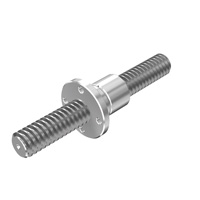
Screw Nut, Screw Shaft, CS Type
THK
The nut and shaft are sold separately. Use together with THK nuts and shafts (DCM, DP, SS). The shaft is cut with no surface treatment.
[Features]
· This DCM shape / DC shape screw nut is a 30° lead screw manufactured according to the applicable standards.
· The nut uses a special alloy, and is diecast molded with a precision male screw as its core.
· For this reason, it has less variation in accuracy than machined products, and is a bearing with high accuracy and excellent abrasion resistance.
· The combination screw shaft is standardized through a rolling formation method.Shaft Shape Nominal of Thread D(Ø) Thread Position Thread Pitch(mm) Shaft Material Shaft Surface Treatment Type Tolerance of Central Part (Incomplete Threaded Portion) Screw Nut Shape Screw Nut Material Screw Nut Outer Dia. D(Ø) Screw Nut Length L(mm) - 12 ~ 36 Right-Hand Thread - - - Screw Nuts - Straight Zinc Alloy 22 ~ 52 22 ~ 49 Days to Ship: 5 Day(s) or more  5 Day(s) or more
5 Day(s) or more
| Brand |
|---|
| Product Series |
| CAD |
| From |
| Days to Ship |
| Shaft Shape |
| Nominal of Thread D(Ø) |
| Thread Position |
| Thread Pitch(mm) |
| Shaft Material |
| Shaft Surface Treatment |
| Type |
| Tolerance of Central Part (Incomplete Threaded Portion) |
| Screw Nut Shape |
| Screw Nut Material |
| Screw Nut Outer Dia. D(Ø) |
| Screw Nut Length L(mm) |
You can add up to 6 items per a category to the compare list. | |
| Brand | THK |
| Product Series | |
| CAD |
|
| From | - |
| Days to Ship | 5 Day(s) or more |
| Shaft Shape | - |
| Nominal of Thread D(Ø) | 12 ~ 36 |
| Thread Position | Right-Hand Thread |
| Thread Pitch(mm) | - |
| Shaft Material | - |
| Shaft Surface Treatment | - |
| Type | Screw Nuts |
| Tolerance of Central Part (Incomplete Threaded Portion) | - |
| Screw Nut Shape | Straight |
| Screw Nut Material | Zinc Alloy |
| Screw Nut Outer Dia. D(Ø) | 22 ~ 52 |
| Screw Nut Length L(mm) | 22 ~ 49 |
Loading...
Configure
Specification/Dimensions
-
Shaft Shape
-
 Straight
Straight -
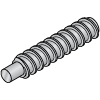 One End Stepped
One End Stepped -
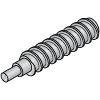 One End Double Stepped
One End Double Stepped -
 Both Ends Stepped
Both Ends Stepped -
 One End Stepped, One End Double Stepped
One End Stepped, One End Double Stepped -
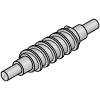 Both Ends Double Stepped
Both Ends Double Stepped
-
-
Nominal of Thread D(Ø)
-
Thread Position
- Right-Hand Thread
- Left-Hand Thread
- Right and Left-Hand Thread
- Precision Right and Left-Hand Thread
-
Thread Pitch(mm)
-
Shaft Material
- Steel
- Stainless Steel
-
Shaft Surface Treatment
- Not Provided
- Low Temperature Black Chrome Plating
- Black Oxide
-
Type
- Lead Screw
- Screw Nuts
-
Tolerance of Central Part (Incomplete Threaded Portion)
-
Screw Nut Shape
-
Screw Nut Material
-
Screw Nut Outer Dia. D(Ø)
-
Screw Nut Length L(mm)
Narrow search by specifying Manufacturer
Related Categories to Lead Screws, Nuts
FAQ Lead Screws, Nuts
- Question: How do lead screws and ball screws differ in their applications and efficiency?
- Answer: Lead screws and ball screws differ in their applications and efficiency due to design variations. Lead screws, using a threaded shaft and nut, suit low-speed, low-precision tasks like manual adjustments. They typically exhibit lower efficiency due to higher friction. In contrast, ball screws integrate ball bearings between the screw and nut, enhancing efficiency, precision, and speed. Consequently, ball screws find favor in high-precision, high-speed applications such as CNC machining, robotics, and aerospace systems where smooth, precise motion is critical, offering superior performance compared to lead screws.
- Question: What should be considered when choosing the size of a lead screw for a specific application?
- Answer: When choosing a lead screw size for an application, consider factors like load capacity, speed, and precision requirements. Determine the necessary length, pitch, and lead based on travel distance and desired linear speed. Ensure proper end support and mounting arrangements to prevent instability. Also, consider environmental conditions, material choice, coating, and acceptable backlash levels. By carefully weighing these aspects, you can select the appropriate lead screw size to ensure optimal performance and reliability for your specific application.
- Question: What are the advantages of using a 30-degree trapezoidal lead screw with a double-end step?
- Answer: Using a 30-degree trapezoidal lead screw with a double-end step offers numerous benefits. These include enhanced load capacity, improved stability, reduced backlash for precise positioning, increased efficiency due to smoother operation, and versatility allowing for flexible design options utilizing both ends. Overall, this configuration provides strength, stability, precision, and adaptability, making it ideal for a wide range of industrial and mechanical applications requiring reliable and precise linear motion.
- Question: What are the different types of lead screws?
- Answer: Lead screws come in various configurations based on thread design, number of starts, and material:
Thread design: Acme threads are the most common, offering a good balance of strength and efficiency. Other options include buttress threads for high axial loads and metric threads for international standards.
Number of starts: A single-start lead screw translates one rotation into the distance of one thread (pitch). Multi-start screws (double, triple, etc.) have multiple threads that move simultaneously, resulting in faster linear travel per rotation.
Material: Lead screws are typically made from steel or stainless steel for strength and durability. Polymer options can be used for lighter weight and corrosion resistance in some applications. - Question: What factors should be considered when selecting a lead screw for high-load applications?
- Answer: When selecting a lead screw for high-load applications, factors such as load capacity, material strength, diameter, pitch, nut design, and lubrication must be considered. The lead screw should withstand the anticipated load without deformation, requiring a material with high tensile strength and a robust nut design. A larger diameter and coarser pitch help distribute the load effectively, minimizing deflection. Proper lubrication reduces friction and wear, prolonging the lead screw's lifespan under high-load conditions, ensuring reliable performance in demanding applications.








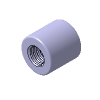
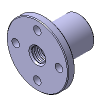



How can we improve?
How can we improve?
Thank you for your time.
Your feedback is essential for our continuous improvement
Privacy Policy
Thank you for your cooperation.
Thank you for your time.
Your feedback is essential for our continuous improvement
Please use the inquiry form.
Privacy Policy